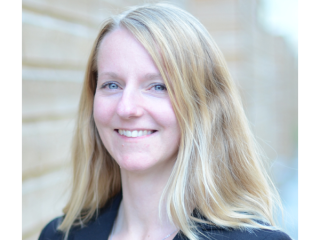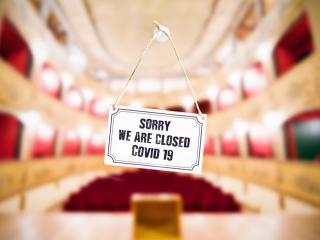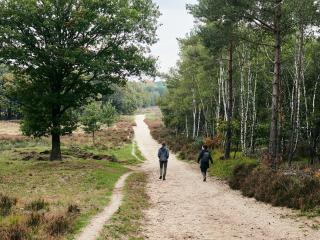Marino van Zelst (RedTeam) does not want to churn out figures
The life of Marino van Zelst (30), PhD student of Organization Studies at Tilburg University, has been largely dominated by corona figures in the past year. Thousands of Twitterers and many journalists follow his daily updates with figures on new infections, people admitted to hospital, deaths, and excess mortality. He was even appointed to the RedTeam, an independent expert group that gives advice, on its own initiative, on the approach to the corona crisis.
by Doetie Talsma
“Before corona, not more than a handful of colleagues or friends used to react when I twittered about my field of study. I was just a PhD student who occasionally said something about Organization Studies. I could have twittered the most peculiar things because there was hardly any response anyway. I didn’t, by the way, because for me Twitter has always been an important information source for me, but still.
“Today it is also a channel for sending messages and to have interaction. I now have more than 13,000 followers. People ask me a lot of questions and I try to answer them, even though that is rather time-consuming.
“I have found out that if I post something on Twitter on the theme of figures and interpretation, journalists are likely to give me a call. That took a lot of getting used to and I consulted with the chair of my Department (Organization Studies), among others. You don't want to compromise the university if you are critical of policies that affect everyone.”
Underestimated behavior
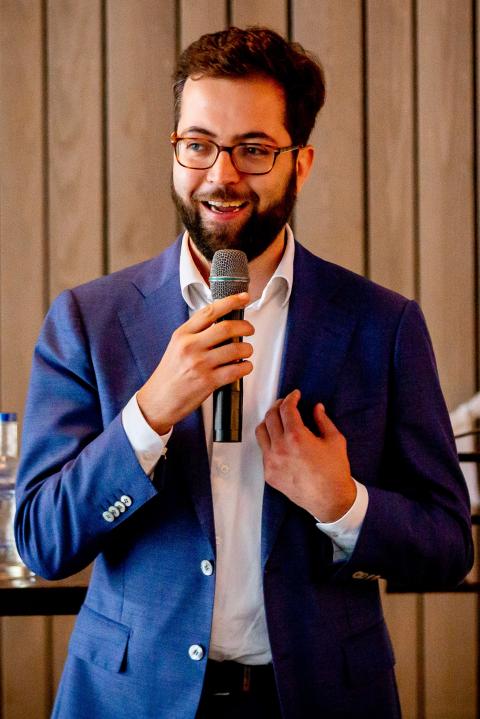
“When I was approached for the RedTeam, I said yes immediately. I had a few conditions that I find very important, though. Firstly, we want to be critical in a constructive way. Just whining is something that anyone can do. And secondly, transparency is a big thing for me, I'm pretty dogmatic about that. So I think it’s important to put everything online, data scripts, the things we do, references, everything. These turned out to be shared values, so any doubts I may have had soon dissipated.
“The RedTeam consists of twelve people who are practical professionals or behavioral experts. For instance, we have an anthropologist, a specialized nurse, complexity experts, field epidemiologists, an economist specializing in health care, and I myself of course, from the Tilburg School of Social and Behavioral Sciences. In addition, we are supported by a community of 150 members who, to a greater or lesser extent, also think about the issues and provide us with information and criticism.
That there is no behavioral expert on the OMT, I personally find that beyond surprising
“The OMT (Outbreak Management Team) that advises the Dutch government is an advisory team consisting purely of health care professionals and biologists. That there is no behavioral expert on the OMT, I personally find that beyond surprising. The corona pandemic is a crisis in every respect, medically, socially, psychologically. You can't address it with purely medical-biological advice.”
“One example of how behavior is underestimated is the discussion concerning the schools. One of our current perspectives is, to put it bluntly: the schools are driving the epidemic; children are great spreaders. The counter argument that was constantly raised is that there are not so many infections there that you have to take such drastic action. We should be concentrating on measures to protect the elderly and the vulnerable, because children and young people do not get so ill.
“The reaction of our anthropologist Ginny Mooy is: 50% of all Dutch grandparents babysit for at least one day a week and 33% take care of a primary-school child at least one day a week. So it is all very well to say that you want to protect the elderly and the vulnerable, but if all hell breaks loose in those schools and granny and granddad continue to mind the grandkids, how are you going to protect the elderly? This is about understanding how society works and what place grandparents have in it.
I have found out that if I post something on Twitter on the theme of figures and interpretation, journalists are likely to give me a call
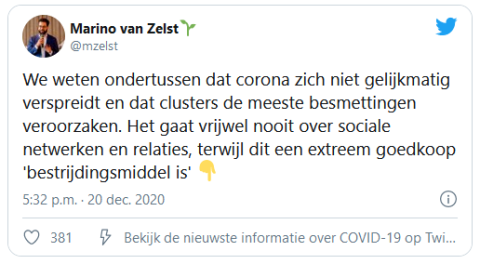
The story behind the figures
“Within the RedTeam, I am the ‘figure guy’, but I talk to care workers almost every day. I do not want to just churn out figures; there are people with stories behind those figures. These stories are really poignant.
“For instance, like that item in Nieuwsuur, on a lady with kidney problems, who has kept her six-year-old daughter home from school for ten months now. In all that time, this girl has not seen her friends. If she should bring the virus home, it is the end of the road for that mother.
Then I just broke down in front of the telly
“At one point, the reporter asked the girl: ‘Would it be OK with you not to be able to hug your mom if that meant you could play with your friends again?’ The girl looks at her mother and says: ‘No, because I love her so much.’ Then I just broke down in front of the telly.
“The next day, I realized: this is why it can be so hard to practice science in a purely objective way. It’s not about the figures, this is what it is about. How many times do you hear: ‘the infection figures have risen again’, ‘fewer people were admitted to hospital today, down by 50 from last week’, ‘on average, we see ten fewer deaths per day’.
“And then I think: but that still means that, last week, an average of eighty people have died every day and they all leave people behind. After ten months of Covid news, it becomes a kind of figure bingo, and that is what I want to avoid.”
Letting go
“I haven’t had off time for months. On average, I sleep one hour less per night than before the crisis. One activity blends into another, so you need to learn to be organized. I am finishing my PhD, I am teaching, and all the RedTeam activities come on top of all that.
“Especially in the period of September-October I started to feel it. At the time, we were constantly at work and I found it hard to let go. You wake up in the morning and the first thing on your mind is: I’ve got a job, I’ve got Covid-related activities, and I’ve also got a life.
“I was active from early morning till late at night. That became a bit too much so I took a break of about three weeks. That was wise.
In these times of social distancing, I have met so many cool people.
“On the other hand, I have learned a lot in a very short time. You practice science to produce knowledge, but you hope that your work will also make a difference outside the academic world. Over the past few months, I have had that feeling several times.
“Strangely enough, I have met so many cool people in these times in which we had to practice social distancing. That was so valuable. It’s pity that it took a pandemic for this to happen.
“The reactions from the people around me and from the university are very positive. At the Department, I am sometimes referred to as ‘Mister Corona’. During a joint Zoom lunch or Friday afternoon drinks, there is always a colleague who says: ‘Hey Marino, do give us your three-minute corona update. What has happened in Covid country?’ The Vice-Rector, Jantine Schuit, has even sent me an e-mail saying that she was proud; that is a great thing to hear, of course. It motivates me to keep going.”
Hugging at last
“What I look forward to in 2021? Well, hugging my mom and dad, which I haven’t done for ten months. Hugging friends, contact with people.
“If you had asked me the same question at the end of 2019, I would have said: ‘Finishing my PhD’. That wish has not come true, regretfully, but I can live with that. So for this new year, my great wish is graduating, in addition to contact with people and going to festivals. However, the latter is probably not going to happen, no matter how much I might want to. By the time I get to queue for my Covid jab, the festival season will be over.
“The other thing I am looking forward to is not needing to be occupied with corona figures any more. That would give me a lot of peace. But at the moment, I still consider it to be my public responsibility.”
This article was previously published in in Univers
The 'New Common'
The corona crisis has compounded major societal challenges. Tilburg University shares knowledge and insights to reshape our society. We are happy to discuss this New Common.
Date of publication: 18 January 2021

